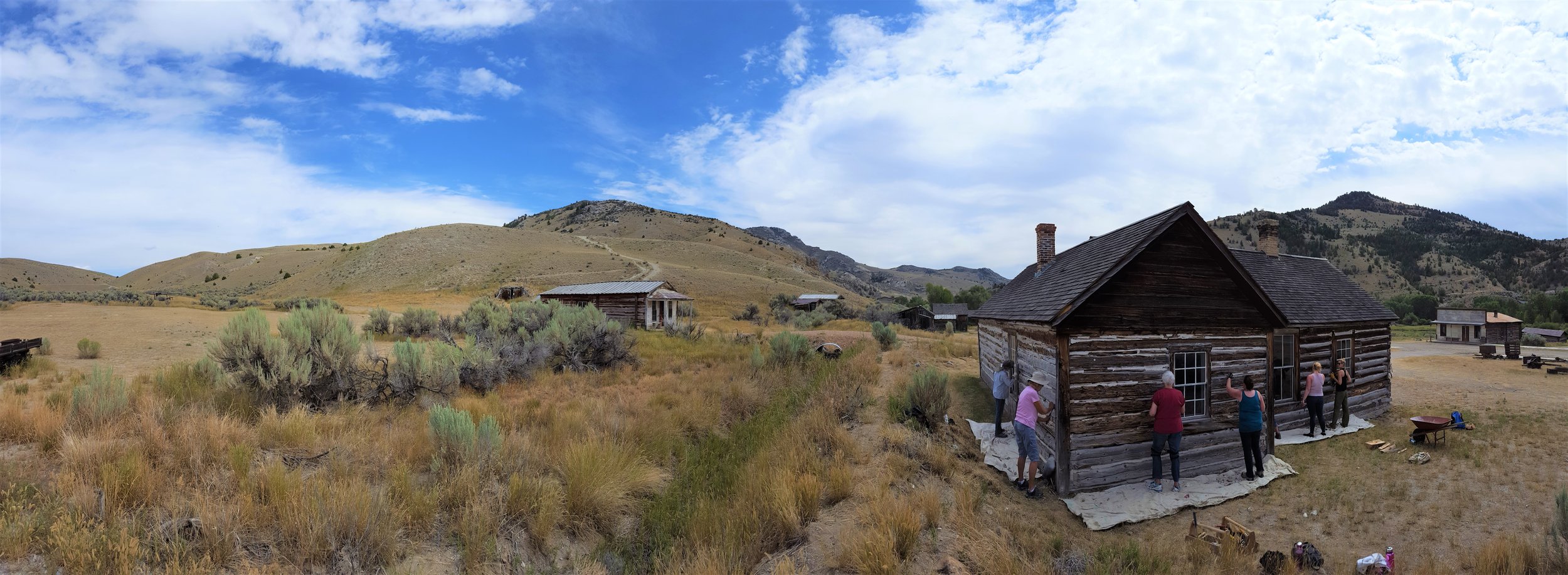
GUIDELINES
Information on how we can help you preserve Montana History
LET’S WORK TOGETHER
We are proud to partner with non-profit and tax-exempt organizations throughout the Treasure State to realize projects that bring history back to life. Read through our guidelines below to see if your project is a good fit for a Foundation for Montana History grant.
Do you have a project that will make a significant contribution to the preservation and interpretation of Montana history? We look forward to working with you to accomplish this critical work.
The Foundation for Montana History offers grants of up to
$10,000 to nonprofit and tax-exempt organizations in the following categories:
Projects will receive preference that
Address a structure, collection, or community that is endangered or threatened
Represent cultural or geographic diversity
Provide a direct, rather than a remote, benefit to the local community
Demonstrate financial support from the community
Show the project will continue after the funding period is complete
Will accomplish the work according to professional and historically accurate standards
Demonstrate a public benefit and/or provide public accessibility
We Do Not Fund
Grants to individuals, including for dissertation research or student projects
General operations such as rents, utilities, or routine maintenance costs
Indirect costs, overhead, and/or facilities and administrative fees
Speakers, lectures, re-enactments, or other public presentations
Travel or entertainment
Equipment such as digital scanners, cameras, etc.
Sponsorships, including auctions, dinners, tickets, advertising, or fundraising
Organizations that, in policy or practice, discriminate against race, ethnic origin, sex, creed, or religion
Projects with the purpose to satisfy, fund, or retire loans, debts, or other operational deficits from previous projects or past operations
Sectarian or religious organizations seeking funds solely for religious purposes
Political action or legislative advocacy
Regular staff salaries
Grant Requirements
One application per organization will be accepted in a given funding year, regardless of category (see specific criteria for each grant category).
Proposals are invited for projects that will make significant contributions to the preservation and interpretation of Montana's history.
The funding period is from May to June of the following year. Projects not completed within the funding period may be required to return all or a portion of the grant.
Applicants must be either a non-profit tax-exempt organization (IRS designation) or an exempt governmental unit.
Organizations with an open Foundation grant are not eligible to apply.
Requests for personnel costs must be for temporary, seasonal, or student/intern staff wages only.
Project budgets must include a 1:3 match (25% applicant, 75% The Foundation). Volunteer time may be used in this match and should be calculated at $25/hour.
Successful applicants must track all match, in-kind, and cash that is committed to the project as described below. Donated materials and/or volunteer services can count towards the match, along with the actual cash match.
FREQUENTLY ASKED QUESTIONS
-
Applicants must be either a non-profit tax-exempt organization (IRS designation) or an exempt governmental unit.
-
No. All grants must be closed (all reports received and approved) before your organization is eligible to apply again.
-
We strongly encourage you to reach out to our Program Director to discuss your project. You can reach Ciara Ryan at grants@mthistory.org or 406-449-3770.
-
No. The purchase of equipment such as a scanner, cell phones, computers, etc. is not allowable. However, the rental of such equipment—or the cost associated with hiring a contractor, who already has access to such equipment—is allowable.
-
Generally, the Foundation does not require bids from contractors for work under $1,000. If contractor costs are requested for more than $1,000, a bid is highly encouraged. We will accept your application—but it will be scored lower than applications which do have bids/quotes. And, if you receive funding, you will be required to submit a bid/quote before receiving a grant award check.
-
The Foundation does not grant to individuals. For example, we do not fund faculty research or student projects or dissertations.
-
Requests for personnel costs must be for direct project costs, for example, interns hired to complete the project. We generally do not fund the cost of full-time employees working on the project.
-
Grant funds must be used during the grant term cited in your grant agreement. In general, we award in early April and grant funds must be used by June the following year (13 months to expend funds). There can be exceptional circumstances where a grantee requires an extension to complete their project. This is dealt with on a case-by-case basis.
-
No. If our budget template is not used, your application will not be considered. Please call our office at 406-449-3770 if you cannot download the template.
-
The “other sources” column is a place to put additional support, monetary or in-kind, that you have acquired for your project. For instance, if a partner organization will be providing staff time to your project, place those funds in this column.
-
Any project requesting contractor funds totaling more than $1,000 should have a bid or quote from a contractor—ideally one that has experience with historic preservation, as it relates to your project.
Letters of support are encouraged but not required. Photos that detail the problem your project will address are highly encouraged. If you are applying with a fiscal sponsor, a letter from your fiscal sponsor attesting to their support is required. If you are requesting contractor fees for an individual, that individual’s resume is required. If you are requesting personnel costs, resumes for those personnel are highly encouraged.
If you are applying for an oral history project, a waiver request form AND the list of questions that you plan to ask interviewees is required. This holds true for oral history adaptations, such as podcasts.
A completed project budget template MUST be attached to your application.
-
Contact Ciara Ryan, Program Director, at grants@mthistory.org or 406-449-3770
LET’S WORK TOGETHER
We are proud to partner with various organizations throughout the Treasure State to realize projects that bring history back to life.

